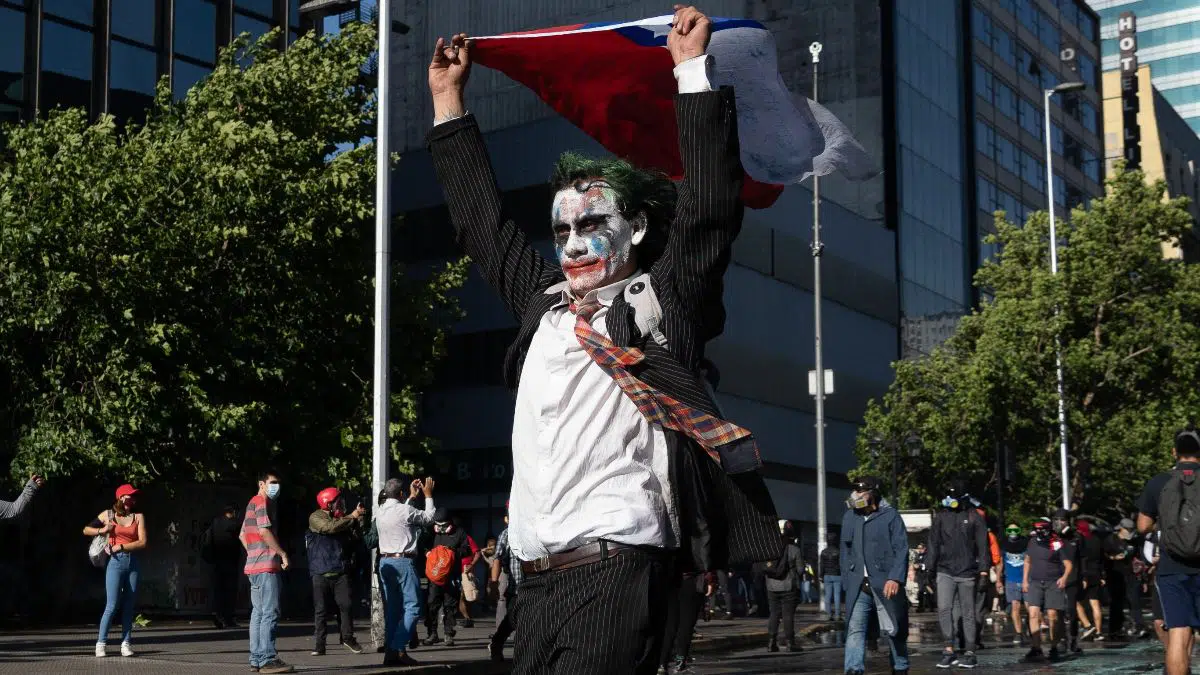By Daniela Carrasco*
(Opinion) Three years ago, Chile was captured by the violence and insurrection resulting from the 18-O riots, with images that left no one indifferent.
While we witnessed a citizenry that moved transversely to the streets, some dissimilar actors raised new expressions of conflict, which generated a deep rift between Chileans.
Three years ago, the institutionality as a whole was also in check.
Therefore, in the face of an incessant insurgency, with the threat of an insurrection escalating to dramatic levels, former President Sebastián Piñera and leaders of all political sectors signed the Agreement for Social Peace and the New Constitution in the early morning of Nov. 15, 2019.

However, despite the opening of the constituent process -which was rejected resoundingly last Sept. 4-Chile has not been able to return to the peace and normality before Oct. 2019 promised in this pact.
For the past three years, Chile has been in the midst of a political process that is still ongoing, in which visions of the individual, society, and the state are being discussed from such conflicting perspectives that dialogue in standard grammar is not possible.
Therefore this article seeks to present a reflective view of present-day Chile.
Because although the analysis of the different events serves us as an economic thermometer, it is also necessary to pause and look at the past, approach the phenomena with serenity and remember their horizons, and understand the current Chilean scenario has been articulated delicately.
Different opinion polls before Oct. 18, 2019, argued that writing a new Constitution was not a priority for Chileans.
The most relevant demands by that time were pensions, the rising cost of living, and improving access to health and education.
While the Congress, the then opposition (former Nueva Mayoría and Frente Amplio), the political party system in general, the Courts of Justice, and the Prosecutor’s Office were the institutions worst evaluated by Chileans.
In fact, according to the Cadem survey of Oct. 6, 2019, the institutions best evaluated by the citizenry were the Investigative Police (PDI) with 80% approval, the Civil Registry (77%), the Navy/Marine (66%), and the Chilean police, Carabineros (61%), institutions that were victimized by public opinion in the revolt.
Likewise, in the weeks before 18-O, there was no demand for constitutional change, although the left had been pushing this agenda long before the insurrection.
One example is sociologist Tomás Moulian, who wrote the book “Chile actual: anatomía de un mito” (Chile today: anatomy of a myth) in 1997.
With sharp hermeneutics, he pushed the idea of the deconstruction of Chilean institutionality.
Moreover, at that time, he had already criticized that the educational system would be sustained by the market (anticipating or, perhaps, driving the speeches of the student mobilizations of 2011) and that the Constitution established a model that generates discomfort.
Of course, subsequently, several leftist figures appeared who continued with similar theses, such as Fernando Atria and Alberto Mayol.
Nevertheless, and despite the above, the reality is that the “Chilean model” has generated significant advances that have been manifested both quantitatively and qualitatively in the lives of Chileans.
Poverty has decreased drastically since 1990, according to data from the Casen Survey, by that year, 68.5% of Chileans were in this situation; by 2000, it was reduced to 37.6%, and by 2017 it decreased to 8.6% (all these figures are updated to the new Casen methodology).
However, with the uncertainty installed since 18-O, this trend has likely stopped and even reversed since, between this month and Jan. 2023, a new Casen measurement of current Chile is being carried out.
Likewise, it has been empirically demonstrated that the “Chilean model” has been successful,
- with reasonable schooling rates, child malnutrition and illiteracy have been overcome;
- enrollments in higher education have increased dramatically in the last decades, and
- women already outnumber men at that level and in the increase of life expectancy.
Likewise, the confirmation that Chileans feel they are better off than their parents confirms that the institutional pillars have been successful, being a reference for the countries of the Latin American neighborhood.
This does not imply ignoring that there were situations that should be corrected and improved, nor does it mean an argument for re-founding everything.
All in all, the 18-O installed a deep rift and distanced us from the path of progress.
It divided Chileans, families, and friends because false antagonisms were installed. At the same time, a vicious circle was consolidated in the institutional framework, with populist measures such as the early retirement of pensions taking advantage of the pandemic.
Objectively, Chile today is no better off than it was three years ago.

This was revealed by the Cadem survey of Oct. 18 of this year, which showed that we are worse off in all dimensions and that no progress has been made.
Moreover, Chileans are demanding not only the problems before Oct. 18, but others have been added:
- inflation;
- uncontrolled irregular immigration;
- increase in violence associated with crime and drug trafficking (cartels that had never before set foot on Chilean soil have arrived), and
- insurrection unleashed in La Araucanía (which has escalated dramatically over the years).
To the above must be added the canceling moods, the “woke” or progressive culture, which assumes deconstruction as a strategy to modify common sense.
Comprehensive sex education (ESI) initiatives seek to exploit the most vulnerable, such as children.
The dignity of the human person is being disregarded with abortion, euthanasia, or the equality of humans with animals and nature, as would have been enshrined in the proposed new constitution rejected in September.
In short, polarization and violence continue in the country.
Insurrectional groups such as the “white overalls”, attacks in La Araucanía, and homicides due to unleashed delinquency are the new normality.
Therefore, it is possible to affirm that the peace promised in the Agreement for Social Peace and the new Constitution never arrived, even though a constituent process was opened.
Here, it is worth pausing briefly.
Because although Chileans approved the drafting of a new Constitution in the referendum (Oct. 2020), with a calm reading, it is possible to reveal that it was a citizen’s response to a fictitious idea presented by the institutions to stop the insurrection unleashed throughout the country.
Likewise, it was a mistake of the political actors to try to negotiate with a molecular insurrection because they were under siege.
Therefore, they could not negotiate -demonstrated by the former Constitutional Convention’s development.
Of course, they opened themselves to a process that was not even a citizen demand at that time but a political agenda of the widowers of Salvador Allende’s Popular Unity.
This is not trivial.
Next year will be the 50th anniversary of the Military Pronunciamiento, the administration that freed Chile from the Marxist-Leninist yoke and the establishment of the dictatorship of the proletariat.
A Cold War cleavage, of course, but one that is still in force in Chilean society.
These ghosts have been haunting Chile and were close to achieving their goal, but were stopped by the will of the Chilean people with the Rejection of the proposed Constitution.
However, the current frenteamplista government does not give up easily since President Gabriel Boric has two reforms underway that seek to dismantle the institutional pillars: the tax reform and the pension reform.
In short, for the last three years, Chile has been going backward in everything that advanced in the previous decades.
And because of ideological biases, the left does not want to recognize that the political process underway harms the country and the social fabric.
On the other hand, the political figures of the center, independents, and some of the right-wing who insist on continuing with the constituent process should focus on the pending and new urgencies, not on political maneuvers.
If they want to negotiate, let it be in favor of the Chilean people and not for their political-electoral gains.
Furthermore, the right-wing entering into discussions of the “social state of rights” is a trap since it is playing in the semiotic field of the left wing.
That is to say; they start by losing.
Finally, the Agreement for social peace and the new Constitution has been a pantomime since they opened all kinds of anomic scenarios, distancing us from the promise of institutional order and the desired stability.
* Chilean political scientist and candidate for a Master’s degree in Political Communication. Researcher at the Jaime Guzmán Foundation and university professor.
With information from Gazeta

